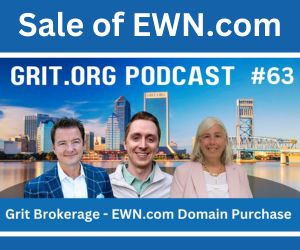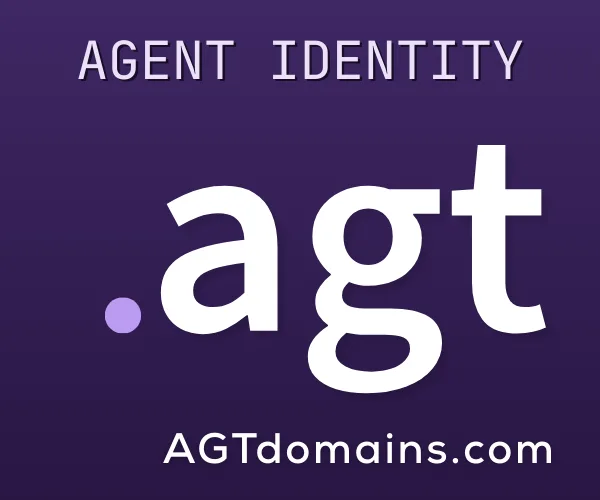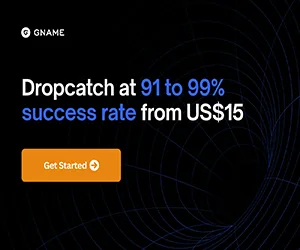Mike Robertson is a renowned domain name broker with a career spanning over two decades in the domain industry. Known for his keen eye for premium domain names and his strategic acumen, Mike has facilitated numerous high-profile domain sales, earning a reputation as a trusted expert in the field. His journey began in the early 2000s when the domain market was still in its semi-early stages. Over the years, he has worked with top-tier clients, helping them secure valuable digital assets that have significantly bolstered their online presence. In addition to his brokering success, Mike can be frequently seen at industry conferences and a respected voice in domain investing communities. His insights and expertise have guided many newcomers and seasoned investors alike, making him a sought-after figure in the domain landscape.
Sully: Can you share the story of how you got started in the domain name industry?
Robertson: I fell into the domain name industry purely by accident. I had completed a Bachelor of Business, majoring in Marketing, with the intention of pursuing a career in the music industry. Music has always been a passion of mine, and I was hoping to get a job at a radio station, record label, or touring company—something in that field. Heck, I would have started as the coffee runner or cleaner just to get a foot in the door.
After a month of interviews and no offers, my bank account was giving me subtle hints that I needed to widen my search and look for alternatives. I interviewed for a sales role at a company called Dark Blue Sea, the parent company of the domain registrar and parking provider Fabulous.com. I was offered the position and, although it wasn’t my dream job, 20+ years later, you could say I grew to love it. And I do mean that with sincerity. It’s such a dynamic, interesting, entertaining, and enjoyable industry to be part of. And I can’t see myself doing anything else.
Sully: What was the first domain name you ever brokered, and how did that experience shape your career?
Robertson: During my time at Fabulous, I had been involved in some smaller domain transactions and portfolio sales. However, the first major and significant domain I brokered was eSignature.com for the late, great Roy Flanders.
Roy and I built a strong friendship during my time at Fabulous. We spent a lot of time together at various domain conferences over the years. When he heard I had started my own company, he asked if I wanted to broker eSignature.com for him. For those not familiar with Roy, he was one of the true OG domain investors. Some of the domains in his portfolio were first registered in 1994-1995. At the time (mid-2011), he wasn’t much of a domain seller, so the fact that he wanted me representing him was an incredible feeling.
I successfully sold the domain to EchoSign (who were acquired by Adobe weeks later) for $150,000. It was the number one sale on DNJournal that week, which helped solidify my name and reputation as a domain broker. As a result, many new leads and business opportunities started flowing in.
At the time, I wasn’t focused on domain brokering. My company was offering an “estate planning” service for professional domain investors. This sale changed the trajectory for me and my career. It gave me the confidence to take on bigger domains. It was at that point that I decided to pivot and provide brokering services. Without that sale and the belief and trust Roy had in me, I’m not sure I’d be where I am today.
I think most people can relate: there are key moments in your life when, with hindsight and reflection, you recognize them as pivotal. This sale was definitely instrumental in my career and helped me to get where I am today.
Sully: How has the domain market evolved since you first entered the industry?
Robertson: The industry is almost unrecognizable from when I first started back in 2002. Throughout my career, I’ve witnessed most iterations and major developments within the industry. Back then, it was all about domain parking, and domain sales were few and far between. Now, domain sales are the most significant and profitable aspect of monetizing a domain portfolio.
The names and faces of key players in the industry have changed too. Companies have folded, been sold, and been absorbed into bigger companies. That said, it’s refreshing to see some of the original guard (both individuals and companies) still grinding as hard, if not harder, than when I first met them.
The industry has also grown exponentially. It is clear that there are many more people involved now than when I first started. This growth indicates that there are still opportunities to enter the game and make money. I think new TLDs have played a big part in that. Love them or hate them, they have brought more opportunities and money into the space.
Sully: Tell me about some of the business contacts and friends you have developed over the years. Are you proud of the people that represent the domain industry?
Robertson: I will say, the people in the domain industry are some of the most generous and inspiring people I know. At various times in my life, I’ve raised funds for different charities and organizations that are meaningful to me. Every time, the domain industry has rallied behind me and shown incredible support and kindness with their donations.
In 2007, both of my parents were diagnosed with cancer, and I decided to participate in the “Shave For a Cure” fundraiser. I don’t remember the final tally, but it exceeded my initial goal. I recall being completely floored by the outpouring of messages, support, and kindness.
The same thing happened in 2019 when we lost the beloved industry veteran Charlie (Charlotte) Gilbert to a long battle with pulmonary hypertension. Charlie passed away on January 30th, and by chance, the Pulmonary Hypertension Association was holding a fundraiser in Tampa (where I was living at the time) that weekend. In three days, I raised $3,275, largely due to the generosity of those in the domain industry, which is a testament to the quality and character of those in the space.
Having been in the industry as long as I have, you build a large network of contacts, some of whom I consider friends, and if you’re lucky, a small number become family. I would like to give a special shout-out to three in particular: Brian Gilbert, Kellie Peterson, and Michael Ward. All have welcomed me into their homes and lives over the years, creating lifelong bonds and special memories.
So yes, I’m extremely proud of those in the domain industry and have enormous respect for them. Sure, there have been some individuals and companies over the years that I don’t necessarily agree with, and we have differing values, ethics, and levels of respect. But for the most part, I genuinely believe the majority of those in the industry are hardworking, innovative, intelligent, passionate, kind, and caring, and those are the ones I choose to surround myself with.
Sully: What is Mike Robertson's criteria for defining a premium domain name?
Robertson: Firstly, the domain needs to have inherent value, demand, and utility. It’s often thought that one-word domains are premium domain names, but not all domains are created equally. Sesquipedalian.com is a one-word domain, but it’s not what I would consider a premium domain name.
Factors I take into consideration when determining if a domain is premium or not:
- Is it memorable? Will you be able to recall the domain hours or days later after hearing it? Does it pass the radio test? Short and easy-to-spell domains step to the front of the line.
- Domain extension plays a big part. When advising and consulting for clients, I always suggest .com as the TLD of choice. Obviously, there are times when other extensions might be better suited, for example, country-specific clients where the ccTLD is more commonly used (e.g., .com.au, .co.uk, .de, etc.).
- Keyword/phrase. Is it a popular word or phrase? It must have a decent search volume score. Is it commercial (advertiser depth and PPC rates)? Or does it have strong brand potential?
Sully: Are you involved in or at all interested in the Web 3.0 concept?
Robertson: To be honest, I’m not active in Web 3.0 developments. I would describe myself as a curious bystander, someone who is following the discussions and evolution of that market, but I’m not actively involved per se.
Sully: What is one of the biggest hurdles you face as a broker? How do you navigate around it?
Robertson: Right now, the biggest challenge for me is allocating my time. Aside from brokering, I manage four different domain portfolios. I’m responsible for everything from renewals, monetization, sales, and acquisitions.
I’m also an active participant in an online community where I freely share my domain name experience and knowledge with other members. I make myself available to answer questions and assist with various requests from members. I think it’s important to give back, which is why I’m always willing to be a resource to those that may need it. It’s also a way to represent the domain industry in a good light, when it is often unfairly given a bad reputation.
When it comes to brokering, I focus on not overloading myself with too many clients and domains. These days, I’m doing 90% acquisitions and 10% outbound sales. As a one-man band, I try not to take on more than I can handle, as I am very conscious of maintaining a work/life balance. Additionally, I want to ensure I’m providing top-tier service to each of my clients. I don’t want to jeopardize the quality of my work and performance by taking on too much. I know I’m lucky to be in a position where I can refer business to other brokers—I just wish there was a way to clone myself. Though I’m not sure the world needs more of me; I already have an identical twin brother!
Sully: My focus has been on helping beginner domain name investors learn the trade. What advice would you have for someone looking to get started in domain name investing?
Robertson: Education is the number one thing new domain investors need to understand. This isn’t a get-rich-quick scheme, and if they think that, they are in the wrong industry. It’s not as simple as registering or buying a few domains and selling them the next day. It doesn’t happen like that. It comes down to selecting domains that have resale value and having a lot of patience.
I suggest that new investors read and learn as much as they can about the industry before spending any money acquiring domains. This means reading blogs, forums, and other resources. I know you’ve published a book, "Domain Sales Emails That Work!" I’ve personally read it twice and always get something new out of it. I’ve also referred people to both DNAcademy.com and your "Beginner’s Guide" online courses.
There’s a lot of information out there from domain investors chronicling their personal journeys into domain investing. They share the “Do’s and Don’ts” of the industry. Learn from others’ experiences and pave your own way. AbdulBasit Makrani is someone who shares a lot of information and chronicles his monthly sales. I highly recommend reading his blog (abdulbasit.com).
At the end of the day, there’s no cookie-cutter approach to domain investing. Focus on your strengths. Work within your financial means. If you ask for advice from experienced domain investors, listen and don’t get offended if you don’t like what you hear. Have realistic expectations.
I like to use the “One Red Paperclip” case study as an example. For those not familiar, Kyle MacDonald traded his way from a paperclip to a house. Truly remarkable. So, my advice would be to start with a handful of domains. Learn the basics. When you make sales, take the profits and upgrade to better/more valuable domains.
Sully: Do you believe that there is a formula, a mathematical means by which one can accurately estimate the value of a domain name? If so, what is it? If not, why?
Roberson: I personally don’t believe there’s an accurate formula to value domain names. I do look at various online appraisals, but I take them with a grain of salt. They can be helpful when reviewing large lists of domains, weeding out the trash, and letting the cream rise to the top.
There are numerous variables to consider when valuing domains, and some of those market conditions can change without warning. Will the formula address those in real-time?
I’ll give a real-life example of one particular domain that I’ve sold three times. In 2015, the domain was sold for $100K on a payment plan. The buyer forfeited the domain after paying more than 50% of the price. Fast forward to 2018, the domain sold on another payment plan, this time for $300K. After receiving over $100K in payments, the buyer defaulted. Then in 2021, the domain was sold outright for a seven-figure price tag. I’m withholding the domain name only because it is now listed for sale on one of the popular marketplaces.
I checked the various online appraisal tools, and none of them value the domain in the seven-figure range—not even close. Each time the domain was sold, I firmly believed we were selling at a fair market price. It just happens that there were market conditions over the years that made it more valuable, which I doubt an algorithm would have factored in.
Sully: I'm all about embracing failure and using it to learn and improve. Can you think of a time that you may have "failed" or had a setback in domaining and what you learned from it?
Robertson: I’m of the opinion that it’s only a failure if you didn’t learn something from the experience. I’ve had a few setbacks, one of which was the “estate planning” business I was involved in. I still think it’s a service that’s desperately needed in the industry. We were just ahead of the curve. At that time, the industry was still in its infancy, and we didn’t have any test cases to draw upon. Since then, we’ve seen a number of prominent domain investors pass away, leading to uncertainty about the succession of those portfolios, which is sad.
The lesson I learned in this particular instance was the importance of pivoting. It wasn’t a bad idea; it was a timing issue. I think if someone were to offer an “estate planning” solution today, it would be received a lot better and would be a successful endeavor.
Another setback I experienced taught me an invaluable lesson: “know your worth.” I won’t go into specifics, but the incident made me realize I have a lot more inner strength and confidence than I had realized. It also showed me the power in knowing which battles are worth fighting and when to walk away, all while maintaining a level of grace, dignity, respect, and self-worth.
In hindsight, this particular experience is one of those pivotal life moments. While it was difficult at the time, now that it’s long in the rearview mirror, it was something that needed to happen. It changed the trajectory of my life and career. It also showed me I had more courage than I knew and taught me to be fearless.
You can reach Mike at his website https://www.mikerobertson.com.au or on X @Mikey_Robbo





